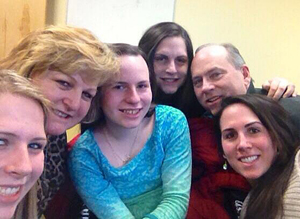Behaviorism and Mental Health –
May 9, 2014
By Philip Hickey, Ph.D.
The controversy surrounding Justina Pelletier and her family has expanded its scope in recent months, and has now become a general public scrutiny of Massachusetts’s Department of Children and Families.
On April 29, State Governor Deval Patrick gave a press conference in which he announced the resignation of DCF Commissioner Olga Roche.
I think there’s a very real risk of confusing some issues here. The sad fact is that, despite the enormous strides we have made as a society, there are still a great many children who are abused and neglected. Every state in the US has a social services department, one of whose statutory responsibilities is to investigate reports of abuse and/or neglect. The case workers who conduct the investigations are required to follow set procedures. Often they find that the allegation is unfounded, and the investigation is terminated. When they do find probable cause, they are required by law to present their findings to a judge, who scrutinizes the evidence in accordance with the normal judicial procedures. The social services department, the parents, and the child are usually represented by attorneys.
A wide range of options is available to the court, from outright termination of parental rights to outright dismissal of the case. Both of these extremes are rare. The usual outcome is some kind of remediation program, whereby the parents are encouraged and coached in childcare matters. Sometimes the children are placed in foster homes pending resolution of issues in the home. If the home issues aren’t resolved, the foster care placement can be lengthy.
The system isn’t perfect. Mistakes get made, and sometimes the mistakes are serious. I have no way of knowing if the Massachusetts Department of Children and Families was more error-prone than social service departments in other states. Obviously the commissioner Olga Roche has to take responsibility. But whether she was personally derelict in her duties or was just the designated fall-gal, I don’t know.
But this I do know: the spotlight has been taken off psychiatry.
The central issue in Justina’s case was, and is, the “diagnosis” of somatic symptom disorder and the allegation of medical child abuse. And there’s a danger of losing sight of that when a departmental commissioner gets tossed to the wolves and the state governor says
“DCF has one of the toughest assignments imaginable. Every single day they’re called upon to intervene and make difficult decisions…And most of the time, DCF gets it right.” (Quoted from a Metro article by Morgan Rousseau).
Most of the time, DCF does get it right. Most of the time they’re dealing with allegations of blatant abuse and neglect; children being raised in unsanitary and unsafe conditions; children being sexually abused and even prostituted; etc… Social services case workers investigate these complaints on behalf of society. They are bound by strict procedures, and when they go to court they are subject to cross-examination, and their findings are subject to official and legal scrutiny.
The issues are never simple, but the critical questions are usually clear and understandable. If a child has a broken bone, X-ray reports are introduced into evidence, and the radiologist is subject to cross-examination. If there are allegations of an unsafe home environment, photographs are produced. If there are live electric wires protruding from wall sockets, everybody in the courtroom can see the pictures, and everybody knows the potential danger if there are toddlers in the home. And so on.
But all of this changes in a case of “somatic symptom disorder” and alleged medical child abuse. In these cases the issues, the “realities,” consist entirely of psychiatric opinion. When a psychiatrist states on the witness stand that the child “has somatic symptom disorder,” the impression is conveyed that this is a real illness with the same kind of verifiable reality as asthma or diabetes or kidney failure. So there’s a very strong tendency for the lawyers, and even the judge, to afford the same kind of respect to a psychiatrist’s statement as they would to a report from a radiologist or other genuine medical specialist.
What’s not routinely recognized is that the psychiatric “diagnosis” is nothing more than the psychiatrist’s opinion. In the case of Justina, the “diagnosis” was somatic symptom disorder, which simply means that Justina in the opinion of a psychiatrist, was inordinately preoccupied with her medical condition.
I have worked with a great many sick people over the years, and have struggled with chronic medical problems myself, and frankly, I can’t even imagine how one could assess whether a person’s concerns in these areas were excessive or inordinate. And this is especially the case in that, since DMS-5, the “diagnosis” of somatic symptom disorder can be assigned even in cases where the person actually has a real illness!
And the allegation of medical child abuse simply means that, again in the opinion of a psychiatrist, Justina’s parents had been foisting on her the notion that she was sick, and had pressured various surgeons and other specialists to subject their child to extreme and invasive medical procedures.
Here we have no photographs of exposed electric wires; no reports of young children being left home alone; no evidence of malnutrition or emaciation; no medical evidence of young children having been sexually abused; no X-ray reports of broken bones; etc… Only the opinions and the invented “diagnoses” of psychiatrists!
When Governor Patrick stated that DCF usually get things right, he made no distinction between the kinds of abuse/neglect that social services departments traditionally investigate and the inherently vague psychiatric “abuse” of which Justina’s parents stand accused.
It was perhaps inevitable that media coverage of Justina’s case would expand into a general criticism of DCF and the commissioner. Criticism of that sort is healthy, and is one of the cornerstones of democracy. But what’s noteworthy at present is that we’re seeing very little coverage of psychiatry or of the role that the psychiatric “diagnosis” played in this matter. This is critical, because without the “diagnosis” of somatic symptom disorder and the subsequent allegation of medical child abuse, none of what’s happened to Justina and her parents could even have gotten off the ground.
Psychiatry captured Justina with one of their spurious labels, confident, presumably, that the parents would cave and play along. But the parents rebelled, and the psychiatric sham was exposed for what it is. Psychiatry, as usual, had no rational defense, so instead they side-stepped the issues, and the spotlight has moved elsewhere.
And let’s not forget that psychiatry’s leaders are being schooled by Porter Novelli, a major PR firm, in how to interact with the media.
http://www.behaviorismandmentalhealth.com/2014/05/09/social-services-and-psychiatry/
Also watch this video with Congressman Steve Stockman discussing the Justina Pelletier case and his bill H.R. 4518, the “Parental Protection Act.”




SHARE YOUR STORY/COMMENT